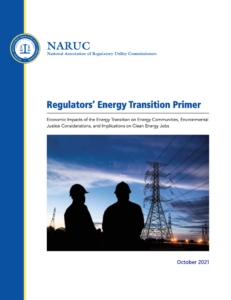Full Title: Regulators' Energy Transition Primer: Economic Impacts of the Energy Transition on Energy Communities, Environmental Justice Considerations, and the Implications on Clean Energy Jobs
Author(s): National Association of Regulatory Utility Commissioners (NARUC)
Publisher(s): National Association of Regulatory Utility Commissioners (NARUC)
Publication Date: October 27, 2021
Full Text: Download Resource
Description (excerpt):
From the mid-1980s through 2010, coal was a leading source of U.S. energy, providing up to half of the country’s annual electricity. Coal-fired electric power production peaked around 2007, when coal-fired electricity generating capacity in the U.S. totaled 313 gigawatts (GW) across 1,470 generators. A decade later, about 70 GW of this capacity was retired. Many of these retirements were concentrated in Appalachia, the Southeast, the Illinois Basin, and a few in the Midwest and the Four Corners region (northeast Arizona, northwest New Mexico, eastern Utah, and western Colorado). Of the 237 U.S. coal-fired power plants that are still operational, 69 have announced retirement dates near or by 2025.
This primer focuses on the declining coal industry, impacts on communities and workers, opportunities to transition workers who have lost their jobs to clean energy and other related sectors (including hydrogen-oriented jobs), recruitment and training strategies, and available programs and actions to make the shift to a low-carbon economy in a fair, just, and equitable manner by engaging the resources of federal and state governments, as well as the private sector.
